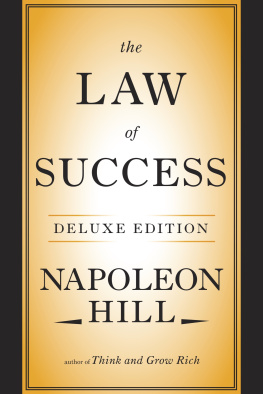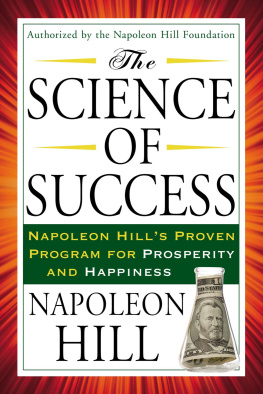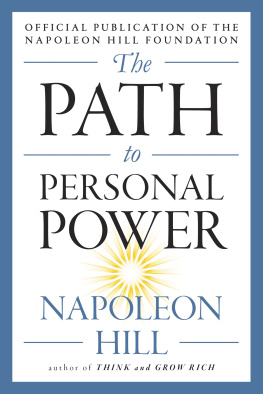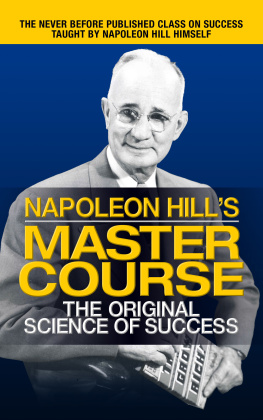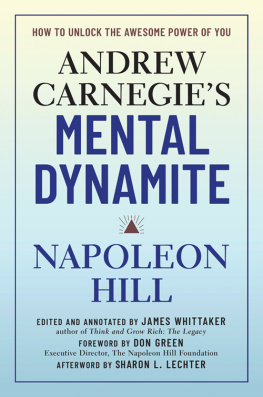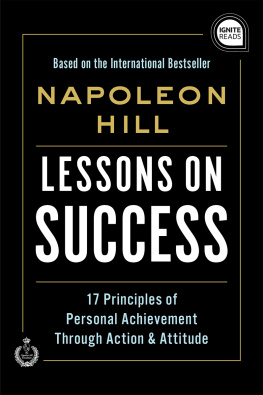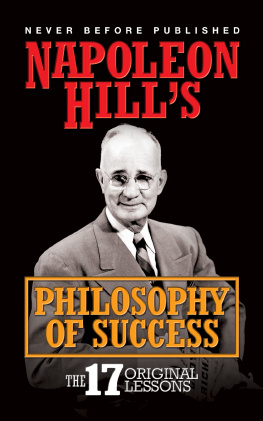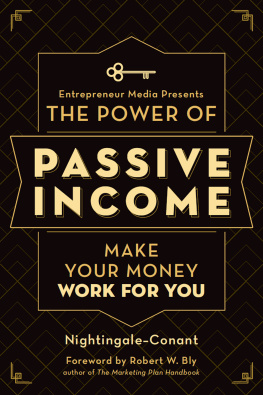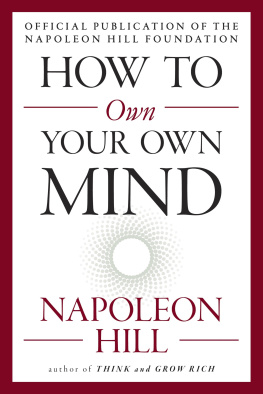Napoleon Hill - The Law of Success
Here you can read online Napoleon Hill - The Law of Success full text of the book (entire story) in english for free. Download pdf and epub, get meaning, cover and reviews about this ebook. year: 2017, publisher: TarcherPerigee, genre: Religion. Description of the work, (preface) as well as reviews are available. Best literature library LitArk.com created for fans of good reading and offers a wide selection of genres:
Romance novel
Science fiction
Adventure
Detective
Science
History
Home and family
Prose
Art
Politics
Computer
Non-fiction
Religion
Business
Children
Humor
Choose a favorite category and find really read worthwhile books. Enjoy immersion in the world of imagination, feel the emotions of the characters or learn something new for yourself, make an fascinating discovery.
- Book:The Law of Success
- Author:
- Publisher:TarcherPerigee
- Genre:
- Year:2017
- Rating:4 / 5
- Favourites:Add to favourites
- Your mark:
- 80
- 1
- 2
- 3
- 4
- 5
The Law of Success: summary, description and annotation
We offer to read an annotation, description, summary or preface (depends on what the author of the book "The Law of Success" wrote himself). If you haven't found the necessary information about the book — write in the comments, we will try to find it.
The Law of Success — read online for free the complete book (whole text) full work
Below is the text of the book, divided by pages. System saving the place of the last page read, allows you to conveniently read the book "The Law of Success" online for free, without having to search again every time where you left off. Put a bookmark, and you can go to the page where you finished reading at any time.
Font size:
Interval:
Bookmark:



An imprint of Penguin Random House LLC
375 Hudson Street
New York, New York 10014
The Law of Success was originally published in 1928
First TarcherPerigee Deluxe Edition published 2017
Tarcher and Perigee are registered trademarks, and the colophon is a trademark of Penguin Random House LLC.
ISBN 978-0-14-313045-1 (deluxe hc.)
ISBN 978-1-52-470477-3 (ebook)
THE LIBRARY OF CONGRESS HAS CATALO GED THE PAPERBACK ED ITION AS FOLLOWS:
Hill, Napoleon, 18831970.
The law of success / Napoleon Hill.
p. cm.
Napoleon Hills The Law of Success was originally published as an eight-volume set in 1928.
Includes index.
ISBN 978-1-58542-689-8 (pbk.)
1. Success in business. 2. Success. 3. Motivation (Psychology). I. Title.
HF5386.H55 2008
2008042052
650.1dc22
PUBLISHERS NOTE
Napoleon Hills The Law of Success was originally published as an eight-volume set in 1928. Other than minor adjustments made for clarity or to meet contemporary typography standards, the publisher has retained the original spellings, usage, and style of the author. The book sometimes features an antiquated reference or word choice. For purposes of historical accuracy, the publisher has largely left these intact.
Version_1
ANDREW CARNEGIE
who suggested the writing of the course,
and to
HENRY FORD
Whose astounding achievements form the foundation for practically all of the lessons of the course,
and to
EDWIN C. BARNES
a business associate of Thomas A. Edison, whose close personal friendship over a period of more than fifteen years served to help the author carry on in the face of a great variety of adversities and much temporary defeat met with in organizing the course.
Who said it could not be done? And what great victories has he to his credit which qualify him to judge others accurately?
NAPOLEON HILL
CONTENTS
Some thirty years ago a young clergyman by the name of Gunsaulus announced in the newspapers of Chicago that he would preach a sermon the following Sunday morning entitled:
WHAT I WOULD DO IF I HAD A MILLION DOLLARS!
The announcement caught the eye of Philip D. Armour, the wealthy packing-house king, who decided to hear the sermon.
In his sermon Dr. Gunsaulus pictured a great school of technology where young men and young women could be taught how to succeed in life by developing the ability to THINK in practical rather than in theoretical terms; where they would be taught to learn by doing. If I had a million dollars, said the young preacher, I would start such a school.
After the sermon was over Mr. Armour walked down the aisle to the pulpit, introduced himself, and said, Young man, I believe you could do all you said you could, and if you will come down to my office tomorrow morning I will give you the million dollars you need.
There is always plenty of capital for those who can create practical plans for using it.
That was the beginning of the Armour Institute of Technology, one of the very practical schools of the country. The school was born in the imagination of a young man who never would have been heard of outside of the community in which he preached had it not been for the imagination, plus the capital, of Philip D. Armour.
Every great railroad, and every outstanding financial institution and every mammoth business enterprise, and every great invention, began in the imagination of some one person.
F. W. Woolworth created the Five and Ten Cent Store Plan in his imagination before it became a reality and made him a multimillionaire.
Thomas A. Edison created the talking machine and the moving picture machine and the incandescent electric light bulb and scores of other useful inventions, in his own imagination, before they became a reality.
During the Chicago fire scores of merchants whose stores went up in smoke stood near the smoldering embers of their former places of business, grieving over their loss. Many of them decided to go away into other cities and start over again. In the group was Marshall Field, who saw, in his own imagination, the worlds greatest retail store, standing on the selfsame spot where his former store had stood, which was then but a ruined mass of smoking timbers. That store became a reality.
Fortunate is the young man or young woman who learns, early in life, to use imagination, and doubly so in this age of greater opportunity.
Imagination is a faculty of the mind which can be cultivated, developed, extended and broadened by use. If this were not true, this course on the Fifteen Laws of Success never would have been created, because it was first conceived in the authors imagination, from the mere seed of an idea which was sown by a chance remark of the late Andrew Carnegie.
Wherever you are, whoever you are, whatever you may be following as an occupation, there is room for you to make yourself more useful, and in that manner more productive, by developing and using your imagination.
Success in this world is always a matter of individual effort, yet you will only be deceiving yourself if you believe that you can succeed without the co-operation of other people. Success is a matter of individual effort only to the extent that each person must decide, in his or her own mind, what is wanted. This involves the use of imagination. From this point on, achieving success is a matter of skillfully and tactfully inducing others to co-operate.
Before you can secure co-operation from others; nay, before you have the right to ask for or expect co-operation from other people, you must first show a willingness to co-operate with them. For this reason the eighth lesson of this course, THE HABIT OF DOING MORE THAN PAID FOR, is one which should have your serious and thoughtful attention. The law upon which this lesson is based, would, of itself, practically insure success to all who practice it in all they do.
In the back pages of this Introduction you will observe a Personal Analysis Chart in which ten well known men have been analyzed for your study and comparison. Observe this chart carefully and note the danger points which mean failure to those who do not observe these signals. Of the ten men analyzed eight are known to be successful, while two may be considered failures. Study, carefully, the reason why these two men failed.
Then, study yourself. In the two columns which have been left blank for that purpose, give yourself a rating on each of the Fifteen Laws of Success at the beginning of this course; at the end of the course rate yourself again and observe the improvements you have made.
The purpose of the Law of Success course is to enable you to find out how you may become more capable in your chosen field of work. To this end you will be analyzed and all of your qualities classified so you may organize them and make the best possible use of them.
You may not like the work in which you are now engaged.
There are two ways of getting out of that work. One way is to take but little interest in what you are doing, aiming merely to do enough with which to get by. Very soon you will find a way out, because the demand for your services will cease.
Font size:
Interval:
Bookmark:
Similar books «The Law of Success»
Look at similar books to The Law of Success. We have selected literature similar in name and meaning in the hope of providing readers with more options to find new, interesting, not yet read works.
Discussion, reviews of the book The Law of Success and just readers' own opinions. Leave your comments, write what you think about the work, its meaning or the main characters. Specify what exactly you liked and what you didn't like, and why you think so.

